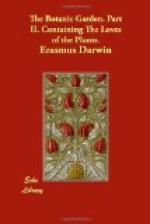[Papaver. l. 270. Poppy. Many males, many females. The plants of this class are almost all of them poisonous; the finest opium is procured by wounding the heads of large poppies with a three-edged knife, and tying muscle-shells to them to catch the drops. In small quantities it exhilarates the mind, raises the passions, and invigorates the body: in large ones it is succeeded by intoxication, languor, stupor and death. It is customary in India for a messenger to travel above a hundred miles without rest or food, except an appropriated bit of opium for himself, and a larger one for his horse at certain stages. The emaciated and decrepid appearance, with the ridiculous and idiotic gestures, of the opium-eaters in Constantinople is well described in the Memoirs of Baron de Tott.]
275 On crystal pedestals they seem to sigh,
Bend
the meek knee, and lift the imploring eye.
—And
now the Sorceress bares her shrivel’d hand,
And
circles thrice in air her ebon wand;
Flush’d
with new life descending statues talk,
280 The pliant marble softening as they walk;
With
deeper sobs reviving lovers breathe,
Fair
bosoms rise, and soft hearts pant beneath;
With
warmer lips relenting damsels speak,
And
kindling blushes tinge the Parian cheek;
285 To viewless lutes aerial voices sing,
And
hovering Loves are heard on rustling wing.
—She
waves her wand again!—fresh horrors seize
Their
stiffening limbs, their vital currents freeze;
By
each cold nymph her marble lover lies,
290 And iron slumbers seal their glassy eyes.
So
with his dread Caduceus HERMES led
From
the dark regions of the imprison’d dead,
Or
drove in silent shoals the lingering train
To
Night’s dull shore, and PLUTO’S dreary
reign
295 So with her waving pencil CREWE commands
The
realms of Taste, and Fancy’s fairy lands;
Calls
up with magic voice the shapes, that sleep
In
earth’s dark bosom, or unfathom’d deep;
That
shrined in air on viewless wings aspire,
300 Or blazing bathe in elemental fire.
As
with nice touch her plaistic hand she moves,
Rise
the fine forms of Beauties, Graces, Loves;
Kneel
to the fair Inchantress, smile or sigh,
And
fade or flourish, as she turns her eye.
305 Fair CISTA, rival of the rosy dawn,
Call’d
her light choir, and trod the dewy lawn;
Hail’d
with rude melody the new-born May,
As
cradled yet in April’s lap she lay.
[So with her waving pencil. l. 295. Alluding to the many beautiful paintings by Miss EMMA CREWE; to whom the author is indebted for the very elegant Frontispiece, where Flora, at play with Cupid, is loading him with garden-tools.]




